Lebanese MP Leaves Bank with Portion of Savings After Sit-in
On Wednesday, a Lebanese parliamentarian joined a growing list of depositors who have stormed banks across the country in recent weeks demanding their savings as the country's financial crisis worsens.

Facts
- On Wednesday, a Lebanese parliamentarian joined a growing list of depositors who have stormed banks across the country in recent weeks demanding their savings as the country's financial crisis worsens.
- Cynthia Zarazir, a member of parliament who was elected in May to represent Beirut, entered an Antelias branch of Byblos Bank unarmed on Wednesday morning with two lawyers. She staged a sit-in for four hours as a "last resort" to access her money to reportedly cover medical expenses.
- Following hours of negotiations, Zarazir eventually left the bank with the $8.5K she demanded. According to her lawyer, the bank made an initial offer to withdraw her savings in Lebanese pounds at a fraction of its dollar value.
- Meanwhile, protesters clashed with police outside the Central Bank HQ in Beirut. A man fired an assault rifle at the glass facade of a bank branch in Byblos after employees wouldn't let him in without an appointment, while an allegedly unarmed man stormed a bank in Beirut's southern suburbs and demanded his savings.
- Zarazir's sit-in comes as a number of depositors have held up banks across Lebanon in the last month. This continued across the country on Tuesday - only a week after banks reopened following a strike prompted by a spree of bank hold-ups in September.
- Depositors have been locked out of much of their savings as banks have frozen accounts and put limits on withdrawals since the country spiraled into a severe economic crisis in late 2019. Since then, the Lebanese pound has lost over 90% of its value and its official exchange rate is set to shift from 1.5K to 15K to the dollar on Nov. 1.
Sources: Associated Press, Reuters, Naharnet, Improve the News, and Al-monitor.
Narratives
- Narrative A, as provided by Al Jazeera. These depositors recouping their funds are heroes, and their actions represent the frustrations of an entire nation deprived of its savings for nearly three years. As millions of Lebanese have been thrown into poverty by corrupt politicians and bank owners, desperate measures are a form of retribution for this injustice.
- Narrative B, as provided by FDD. While the depositors' actions may seem noble to some, they, like many others inside and outside Lebanon, are blaming the wrong people. It's the outside influence of Iran, as well as Hezbollah, that has pushed Lebanon to the brink. The Lebanese people must acknowledge this to truly move forward and fix their country.






